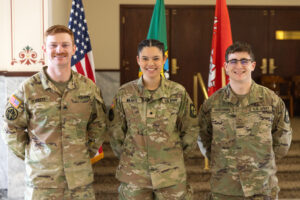Representatives from Fairchild Air Force Base gathered with EWU faculty and staff in the Showalter rotunda on April 5 to celebrate the finalizing of an Educational Partnership Agreement.
The ceremony featured the signing of the partnership agreement by EWU President Shari McMahan and Col. Chesley Dycus, commander of the 92nd Air Refueling Wing at Fairchild Air Force Base. The new partnership program, officials say, will expand experiential learning opportunities for students in the College of Science, Technology, Engineering and Mathematics (STEM) while also providing problem-solving support for Fairchild AFB.
“This will be a mutually beneficial partnership and one with far-reaching impacts,” McMahan said. “Our students pursuing degrees in the high-demand STEM career fields will graduate having built relationships with members of the Fairchild family and having a deeper understanding of real-world application of the skills they’re learning.”
Stu Steiner, assistant professor and director for the EWU Center for Network Computing and Cybersecurity, played a lead role in working with Fairchild representatives to make the agreement a reality. He said the partnership idea originated after EWU cyber security students began working with the National Security Agency as part of its National Security Innovation Network. That relationship with the federal intelligence agency meant that student groups were cleared to work with Department of Defense installations, such as Fairchild Air Force Base.
Initial discussions with Fairchild were, not surprisingly, centered around cybersecurity. However, after a few meetings, Steiner said, Air Force officials concluded that expanding the agreement to include C-STEM would provide more opportunities for both partners.
“Right now, we’re focused on the experiential learning.,” Steiner said. “So, if Fairchild needs a new fuel pump created, we’re going to invite mechanical engineering students to work on it. If they need some design work, we’ll let the design students work on that. There’s plenty of projects out there that we want young student minds to work on real-world projects for the military.”

After the ceremony, which included a color guard flag presentation and the singing of the National Anthem, Dycus offered insights into how the partnership could provide benefits for both institutions.
“There are a lot of problems that the Department of Defense and, more specifically the Air Force and team Fairchild, need help with,” Dycus said. “This helps us get academic — and a lot of other perspectives — involved to help us with those problems. And, hopefully in doing so, it will maybe help us recruit some of those students who are helping us into the Air Force.”
Dycus said last year’s Gray Fire was an example of potential partnership benefits. That catastrophic conflagration, centered around Medical Lake, was chaotic and concerning for Fairchild leaders who found themselves struggling to determine how many of their personnel were impacted. In the aftermath of the fire, a team of four EWU students helped by partnering with the Fairchild team to come up with programming that, in the future, will allow officials to more quickly determine if personnel living off base are safe or in need of assistance.
Another influential figure in making the partnership a reality was Capt. Friedrich H. Martin, Chief Innovation Officer of the 92nd Air Refueling Wing. (Martin is pictured on the left in the group photo below.)
Martin, who earned a bachelor’s degree at EWU in 2005 and a postbaccalaureate degree in geography in 2008, connected with EWU’s Romeal Watson, associate director of employer relations for the Career Center, in planning the partnership agreement along with Steiner.
Like any good agreement, the partnership will work both ways, Martin said. Fairchild can reach out to request help with problems, and EWU can ask about projects available for students. Internship opportunities will likely become available as well.
“There is so much opportunity and potential,” Martin said.